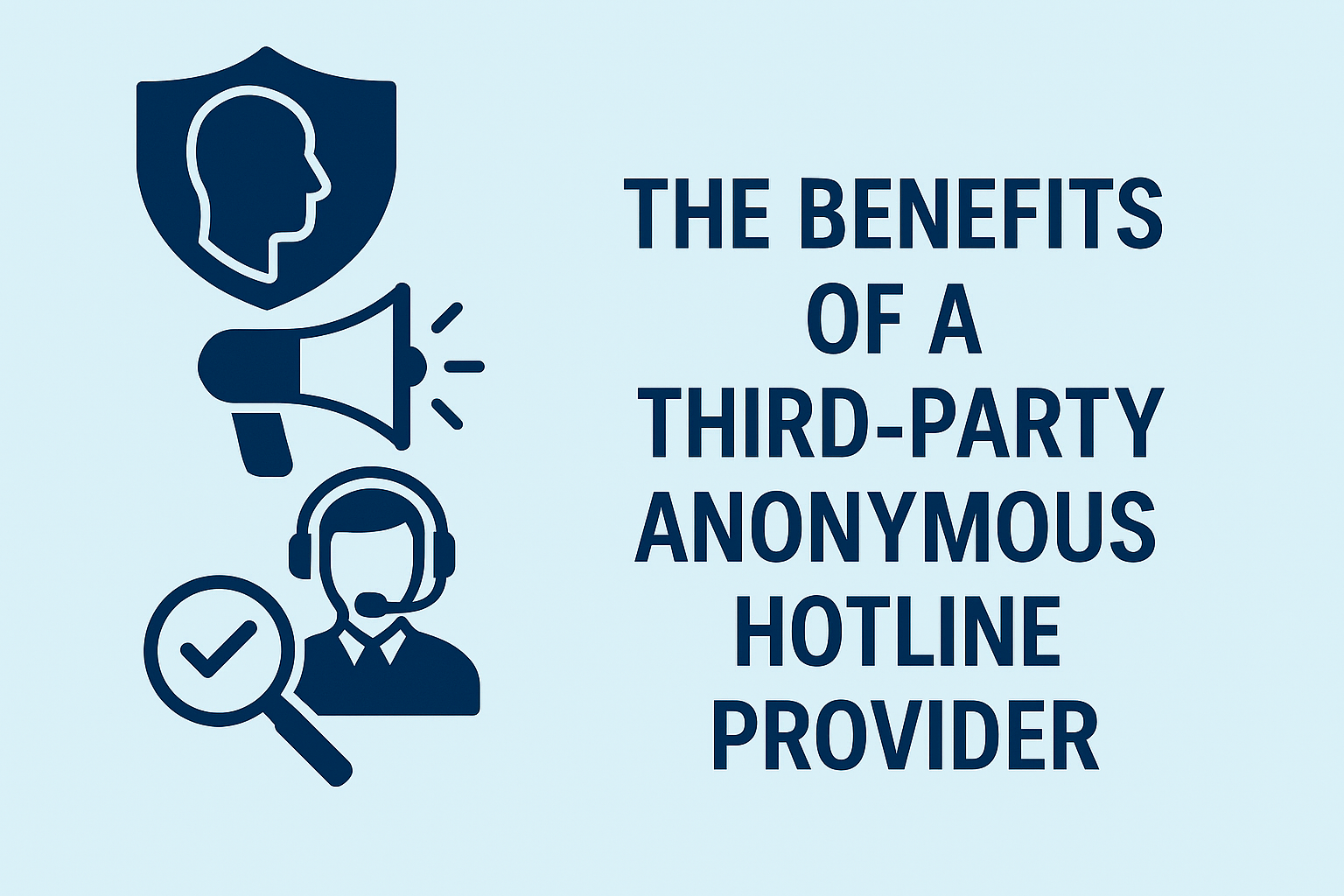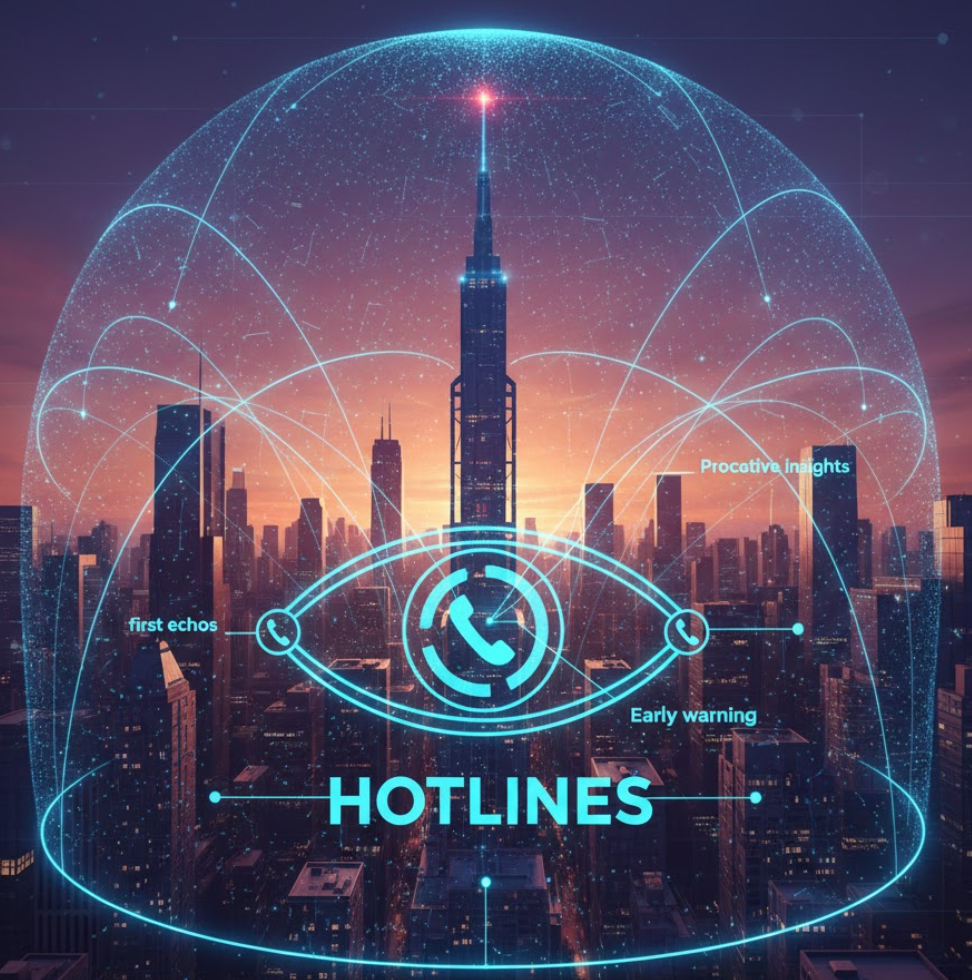5 Benefits of a Third-Party Anonymous Hotline Provider
In today’s business environment, maintaining a culture of integrity is more than a compliance requirement—it’s a competitive advantage. Organizations that encourage employees and stakeholders to speak up about unethical behavior or potential violations protect themselves from financial, legal, and reputational risks. One of the most effective tools for achieving this is a third-party ethics hotline.
Unlike internal reporting systems, outsourcing your hotline to an independent whistleblower hotline service offers significant advantages. It builds trust, reduces fear of retaliation, and strengthens investigations. Here’s why more organizations are making the switch.
- Increased Trust and Credibility
Trust is the foundation of any successful ethics and compliance program. Employees are far more likely to report concerns when they believe the process is impartial and confidential. An anonymous hotline provider offers:
- Perceived neutrality: When reports go to an external party, employees know their concerns won’t be filtered through internal politics or personal relationships. This independence eliminates the perception of bias.
- Professional handling: Third-party providers specialize in compliance and ethics reporting. They follow best practices for intake, documentation, and escalation, ensuring every report is handled consistently and fairly.
This independence reassures employees that their concerns will be taken seriously and addressed objectively. When employees trust the system, they are more likely to report issues early—before they escalate into major problems.
- Reduced Fear of Retaliation
Fear of retaliation is a primary reason employees stay silent, often with good reason. This chilling effect can destroy a speak-up culture.
Outsourcing your hotline helps eliminate this barrier by:
- Guaranteeing anonymity: Employees can report without revealing their identity, reducing the risk of backlash from supervisors or peers.
- Creating psychological safety: Knowing that reports go through an external party makes employees feel safer. They understand that their identity is protected and that the organization values transparency.
When employees feel secure, they are more likely to report concerns promptly, allowing organizations to address issues before they become crises.
- Stronger, More Effective Investigations
A third-party hotline doesn’t just collect reports—it strengthens your entire compliance program. Here’s how:
- Accurate, detailed reports: Professional intake specialists know how to ask the right questions to capture critical details. This ensures investigators have the information they need to act quickly and effectively.
- Centralized case management: Many providers offer secure platforms for tracking and managing investigations. This creates an auditable trail that demonstrates compliance with regulatory requirements.
- Regulatory compliance: Independent services help organizations meet legal and industry requirements for whistleblower protections, such as those outlined in Sarbanes-Oxley and Dodd-Frank, among others.
By improving the quality and consistency of investigations, organizations can resolve issues faster and reduce legal exposure.
- Enhancing Organizational Culture
A strong ethics hotline program signals that leadership values integrity and accountability. When employees see that reports are taken seriously and handled fairly, it builds trust in leadership and reinforces a culture of transparency.
- Encourages early reporting: Employees are more likely to speak up about small issues before they become major problems.
- Protects reputation: Organizations that respond quickly to concerns demonstrate responsibility to regulators, investors, and the public.
- Supports ESG goals: Ethical business practices are a key component of environmental, social, and governance (ESG) initiatives. A robust whistleblower program shows commitment to these principles.
- Cost-Effective Risk Management
The cost of implementing a third-party hotline is minimal compared to the potential financial and reputational damage caused by unreported misconduct. Consider the alternative: regulatory fines, lawsuits, and brand damage can cost millions. A hotline is an affordable insurance policy against these risks.
The Bottom Line
An independent whistleblower hotline service is more than a compliance checkbox—it’s a strategic investment in your organization’s integrity. By outsourcing to a trusted anonymous hotline provider, you foster a culture of transparency, protect your employees, and safeguard your reputation.
Ready to strengthen your compliance program? Explore how outsourcing your hotline builds employee confidence and Partner with Red Flag Reporting. Learn about our hotline services here.
Key Takeaways
- Trust matters: Employees are more likely to report when they believe the process is impartial.
- Anonymity reduces fear: Outsourcing eliminates the biggest barrier to reporting—retaliation.
- Better investigations: Professional intake and case management improve outcomes.
- Culture counts: A strong hotline program reinforces ethical values and ESG commitments.
- Affordable protection: The cost of a hotline is small compared to the risks of silence.
Questions and Answers
Q1: Why should we use an anonymous hotline provider instead of an internal system?
A: A third-party hotline provides neutrality and confidentiality, which builds trust among employees. Internal systems can create concerns about bias or conflicts of interest, discouraging people from reporting issues.
Q2: How does an anonymous hotline provider reduce fear of retaliation?
A: By guaranteeing anonymity and routing reports through an independent service, employees feel safer speaking up. This reduces the risk of backlash from supervisors or peers and encourages early reporting.
Q3: What types of issues can be reported through an independent whistleblower hotline service?
A: Common reports include fraud, harassment, discrimination, safety violations, and unethical business practices. Many providers also allow vendors and third parties to report concerns.
Q4: Does outsourcing a hotline help with regulatory compliance?
A: Yes. Many laws and regulations—such as Sarbanes-Oxley and Dodd-Frank—require organizations to provide secure, confidential reporting channels. Third-party services help meet these requirements and maintain proper documentation.
Q5: Is a third-party hotline expensive to implement?
A: No. Compared to the potential costs of lawsuits, fines, and reputational damage, a hotline is a cost-effective risk management tool. Most providers offer scalable solutions for organizations of all sizes.
Want to know more? Learn about “What is an Ethics Hotline.” See powerful case studies here.
See what others have to say about hotline services here.
Reach Us
Red Flag Reporting
P.O. Box 4230, Akron, Ohio 44321
Tel: 877-676-6551
Fax: 330-572-8146




